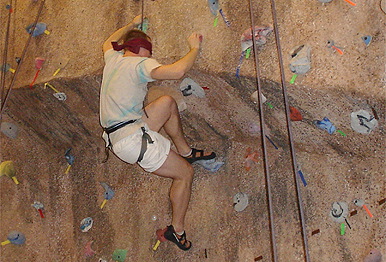Climbing to a position of authority
Crux Program teaches leadership and rock climbing skills

Ben Anderson was beginning to breathe hard. He was 30 feet off the ground, his toes pressed hard against a foothold shaped like a tiny drumlin, his sweaty fingers clinging to a slender handhold 2 feet above his right shoulder. The only thing keeping him on the wall, and keeping him from panicking, was the belaying rope that led to the steady hands of his teammate on the ground. That, Anderson knew, was lesson one of the Crux Program, a joint effort between the BU Sargent Center (BUSC) and the Student Activities Office (SAO) designed to teach the basics of team building, with a little rock climbing thrown in.
Anderson (CAS’07) is one of five students who participated in four two-hour Wednesday sessions in February of a pilot project to develop their leadership potential, which culminated in their ascent of the Barreca climbing wall at the Fitness and Recreation Center. “On the last climb,” he says, “we were challenged to climb blindfolded. It was pretty difficult, but I made it the top with the help of the team below.”
The student leaders were invited by the SAO to take part in the program, which is the latest offering from the BUSC, an outdoor education and conference facility in Peterborough, N.H., that typically offers its programs in leadership and team building — as well as recreation and leisure opportunities — on the center’s 700 acres of woodlands and meadows. For this course, however, program coordinators decided to take their expertise down south.
“The Sargent Center developed what we call the Charles River Team, an outreach program to integrate our campus with the Charles River Campus in a number of ways,” says Robert Rubendall, director of the BUSC. “We built some environmental research infrastructure here to support this kind of activity for students and professors, but there is always going to be this two-hour distance barrier between Boston and Peterborough, so we decided to bring some of our educational opportunities down to Boston.”
The Crux Program takes its name from a term that describes the most challenging portion of a rock-climbing route. “It’s the definitive move in the climb,” says Rubendall. After the crux move, everything falls into place and the summit can be conquered.
Paul Hutchinson, assistant conference coordinator for the BUSC, says the Crux Program began to develop last fall after he and Rubendall talked with the SAO about offering students a leadership program. “We wanted to reach out to students who are on the verge of becoming student leaders and provide them with the tools to take that extra step,” he says. “We found that it would be a great way to connect with student organizations on campus who might not be able to come up to New Hampshire.”
Anderson, a St. Louis native who works as a YMCA camp counselor during the summer, says the Crux Program gave him an opportunity to learn about leadership styles and how to manage a group efficiently. “They put us though team-building games,” he says. “They challenged our perceptions of the roles people play in stressful situations.”
Anderson, who is also an ambassador for the BU Office of Admissions Student Diversity Board, says the most difficult part of the program was trying to climb under the climbing wall’s “bridge” arch. “After falling a lot,” he says, “I moved onto something a little less advanced.”
Hutchinson says that the climbing wall session was the keystone of the program. “It was a powerful experience at the end,” he says. “It brought everyone together.”
The BUSC Charles River Team is developing more programs in the Boston area for students, including outdoor activities such as sea kayaking and a GPS Geocaching Challenge, a treasure hunt that involves the use of a Global Positioning System receiver. Hutchinson says that the team will also continue to offer the Crux Program. “The students’ response was extremely positive,” he says.